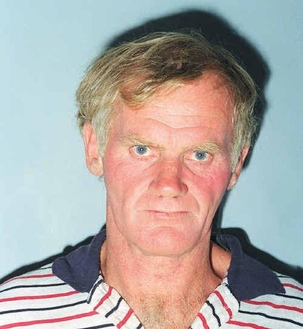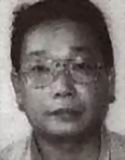Related Research Articles

Anatoly Yuriyovych Onoprienko was a Soviet and Ukrainian serial killer and mass murderer. Known by the nicknames The Beast of Ukraine, The Terminator, and Citizen O, Onoprienko confessed to killing fifty-two people upon being apprehended in April 1996.

Charles "Carl" Panzram was an American serial killer, spree killer, mass murderer, rapist, child molester, arsonist, robber, thief, and burglar. In prison confessions and in his autobiography, Panzram confessed to having murdered twenty-one boys and men, only five of which could be corroborated; he is suspected of having killed more than a hundred boys and men in the United States alone, and several more in Portuguese Angola.

Robert Yale Shulman was an American serial killer. Shulman, a postal worker from Hicksville, New York, on Long Island, was convicted of murdering five women between 1991 and 1996, the year when he was arrested.

Leonard John Fraser, also known as The Rockhampton Rapist, was an Australian convicted serial killer.

António Luís Costa is a Portuguese ex-GNR soldier and serial killer from Santa Comba Dão. He was convicted in 2007 for the murders of three young women between May 2005 and May 2006. He is currently held in the prison of Évora. The case received extensive media attention in Portugal. It was front page in some newspapers.

Hiroaki Hidaka was a Japanese serial killer.
The Nighttime Killers is the media epithet for the killers responsible for a string of brutal murders in Kyiv, Ukraine, between 1991 and 1996. Two men, Vladyslav Volkovich and Volodymyr Kondratenko were arrested and charged with 16 murders. Most victims were shot with a .22 sporting rifle and stabbed or bludgeoned with a wide variety of weapons ranging from stitching awls to bricks and iron bars. The killers claimed that they began the murder spree in order to prepare themselves for an eventual career as contract killers, practicing on the homeless, and continued killing for profit and for fun. Kondratenko killed himself in prison during the trial. Volkovich was found guilty and sentenced to life in prison.

Paul Durousseau is an American serial killer who murdered seven young women in the southeastern United States between 1997 and 2003. German authorities suspect he may have also killed several local women when he was stationed there with the United States Army during the early 1990s. Typically, Durousseau would gain the victim's trust, enter the victim's home, tie their hands, rape, then strangle them to death. All of his known victims were young, single African-American women.
Life imprisonment in Sweden is a term of imprisonment for an indeterminate length. It is the most severe punishment available in Sweden. Swedish law states that the longest punishment, other than life imprisonment, is a fixed prison term of 18 years. However, a prisoner convicted to life imprisonment may appeal a partially served life sentence to the District Court of Örebro for "fixing" the sentence. Upon success, the sentence is commuted to a fixed sentence of any number of years considered proportionate to the severity of the crime, after which standard Swedish parole regulations apply. Due to new legislation taking effect in January 2022, any offender aged 18 at the commission of the murder can be sentenced to life imprisonment. Previously, an age limit of 21 applied. Prior to 2006, all life sentences were issued without the possibility of parole, although executive clemency was widely issued to commute life sentences to fixed-time sentences in a similar way now exercised by the judiciary. This procedure is the only way a sentence longer than 18 years may be issued in Sweden.

Gary Ray Bowles was an American serial killer who was executed in 2019 for the murders of six men in 1994. He is sometimes referred to as The I-95 Killer since most of his victims lived close to the Interstate 95 highway.
Sibusiso Derrick Duma is a South African serial killer who was convicted of two murders in 2007 and five murders in 2009 and sentenced to 8 life sentences in prison. He was mostly active around the City of Pietermaritzburg, KwaZulu Natal.
Kang Ho-sun is a South Korean serial killer who was sentenced to death in 2010 for killing 10 women between October 2005 and December 2008, including his wife and her mother.
Luis Gregorio Ramírez Maestre is a Colombian serial killer who has been convicted of murdering thirty people in various municipalities and cities in Colombia, including Tenerife, Sabanalarga, Aguachica, Santa Marta, Valledupar and Puerto Wilches.

José Manuel Martínez, dubbed El Mano Negra is a Mexican-American former self-described drug cartel hitman. Martínez confessed to an estimated 36 murders and was sentenced to life in prison after being convicted of murder in multiple states. He is incarcerated at USP Victorville in California.
Andrei Mikhailovich Meshcheryakov, known as The Balashikhinsky Maniac, is a Russian robber and serial killer who killed 5 women in the Moscow Oblast in 2002.
Vasily Nikolayevich Bolgarov, known as The Gagarin Killer, is a Russian serial killer who killed four women in Gagarin and Smolensk between 2001 and 2010. After he was released on parole for a double murder, he proceeded to murder two other women in a few days, but was quickly recaptured. For his new crimes, he was sentenced to 25 years imprisonment.
Devendra or Devinder, also known as Doctor Death, is an Indian serial killer and Ayurveda doctor who was sentenced to life imprisonment in 2004 in Rajasthan after he was found guilty of several murders of taxi drivers between 2002 and 2004.

Song Jinghua was a Chinese serial killer who killed and dismembered nine women in Beijing between 2005 and 2007. He was subsequently executed for his crimes in 2011.
Orhan Aksoy, known as The Parcel Killer, is a Turkish serial killer who strangled five people around Istanbul from 2000 to 2001, stuffing their corpses in boxes he dumped in open fields or near construction sites. For his crimes, he was given five life terms and two years of solitary confinement.
References
- ↑ "Prosecution wants 'special' life sentence for serial killer". The New Times | Rwanda. 2008-03-13. Retrieved 2022-08-14.
- ↑ Karimunda, Aimé Muyoboke (2016). The Death Penalty in Africa: The Path Towards Abolition (reprint ed.). Routledge. p. 194. ISBN 9781317036340.
- 1 2 3 solivri (2007-12-03). "03.12.07 - RWANDA/GENOCIDE - SEVEN PEOPLE KILLED IN FOUR MONTHS BY A YOUNG GÉNOCIDAIRE". JusticeInfo.net. Retrieved 2022-08-14.
- ↑ "Prosecution probes serial killer's motive". The New Times | Rwanda. 2007-12-05. Retrieved 2022-08-14.
- 1 2 3 4 "Prosecution wants 'special' life sentence for serial killer". The New Times | Rwanda. 2008-03-13. Retrieved 2022-08-14.
- ↑ Karimunda, Muyoboke (2011). Death Penalty in Africa p. 231